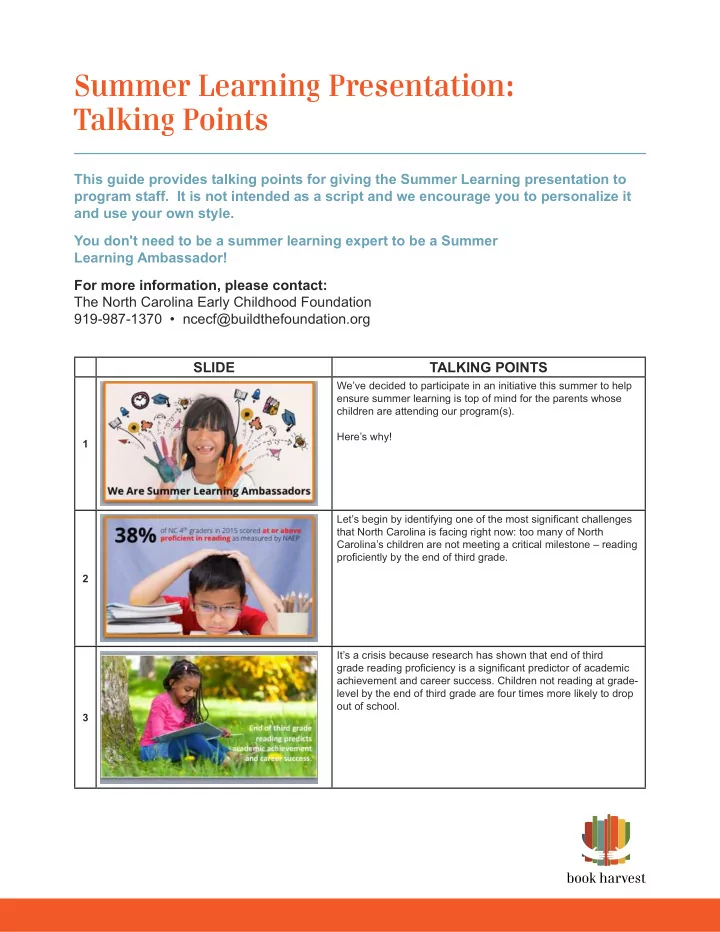

Summer Learning Presentation: Talking Points This guide provides talking points for giving the Summer Learning presentation to program staff. It is not intended as a script and we encourage you to personalize it and use your own style. You don't need to be a summer learning expert to be a Summer Learning Ambassador! For more information, please contact: The North Carolina Early Childhood Foundation 919-987-1370 • ncecf@buildthefoundation.org SLIDE TALKING POINTS We’ve decided to participate in an initiative this summer to help ensure summer learning is top of mind for the parents whose children are attending our program(s). Here’s why! 1 Let’s begin by identifying one of the most signifjcant challenges that North Carolina is facing right now: too many of North Carolina’s children are not meeting a critical milestone – reading profjciently by the end of third grade. 2 It’s a crisis because research has shown that end of third grade reading profjciency is a signifjcant predictor of academic achievement and career success. Children not reading at grade- level by the end of third grade are four times more likely to drop out of school. 3
Summer Learning Presentation: Notes for Program Providers 2/4 SLIDE TALKING POINTS SLIDE HAS ANIMATION. While there is no silver bullet, research has shown what young children need in order to be reading on grade-level by the end of third grade. It takes health and development on track, beginning 4 at birth; supported and supportive families and communities; and high quality learning environments. Note to Presenter: CLICK TO BRING IN ANIMATION Those last two are where we come in. We interact with families every day. Whether it’s in the drop-off or pick-up line, the notes you send home, meetings and events we host – we have a lot of opportunities to support families. 5 And we spend a lot of time with children! Learning is more than classrooms and desks. In fact any environment that has a child is a learning environment. 6 And it’s particularly important that summer provide opportunities for children to learn and to read. Children work hard during the school year and they are learning a lot. Despite that work, they can lose what they learn during breaks and summer. When that happens, they return to school behind. 7 And it adds up. The problem is particularly acute among children from low- income families who lose an average of more than two months in reading achievement in the summer, which slows their 8 progress toward third grade reading profjciency. Some children may never be able to catch up. You can read more here: https://www.summerlearning.org/
Summer Learning Presentation: Notes for Program Providers 3/4 SLIDE TALKING POINTS The good news is that we know what works. Reading books that match children’s reading level and their interest can really help keep them keep learning over the summer. 9 Here are a few examples of the kinds of tips we can share with parents. Remember that the local library is not only a place for books but for programs and resources all summer long! 10 Everyone can play a role. The Campaign for Grade-Level Reading is a great example. It’s a national movement of more than 350 communities across the country working to: • Increase School Readiness - Learning begins long before a child enters kindergarten. Yet there is a school readiness gap with some children arriving to kindergarten as much as 18 months behind in skills critical for school success. 11 • Reduce Chronic Absence - Starting in the early grades, students missing 10% of the school year (about 18-20 days) are losing important time they need to develop literacy skills. • Stem Summer Learning Loss When everyone in the community is engaged, we can make a difference. http://gradelevelreading.net/
Summer Learning Presentation: Notes for Program Providers 4/4 SLIDE TALKING POINTS We can be Summer Learning Ambassadors to encourage parents – the NC Early Childhood Foundation is making it easy! 12 The Summer Learning Toolkit allows us to regularly and easily communicate with parents about summer learning and provide some simple tips. Note to Presenter: At this point, you can share your Action Plan 13 with staff and/or give them an overview of the plan. We have been asked to help ensure summer learning is top of mind for the parents whose children are attending our program(s). Parents say they need supports to encourage summer learning. 14 Here’s an example of a simple and positive message and the types of tips we’ll use. And what is really cool is that these messages were created with the input of parents in our community! July 12, 2018 is National Summer Learning Day. Let’s plan a special day for children attending our program(s) and make a special effort to engage parents. 15 Remember, we’re all Summer Learning Ambassadors!
Recommend
More recommend